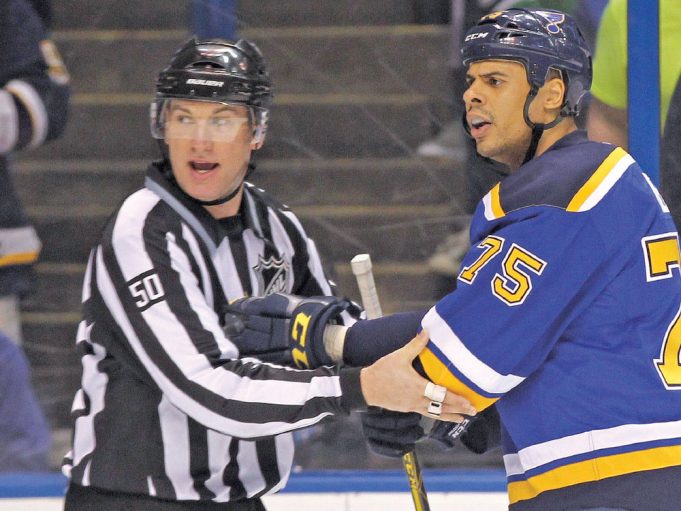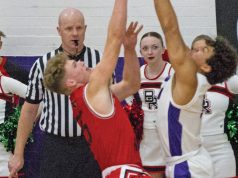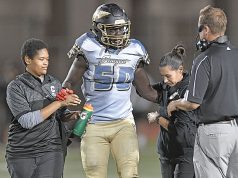When the late Jerry Seeman was NFL director of officials, he developed his 10 Commandments for Officiating. Ninth on his list was: Thou shalt be great dead-ball officials.
Seeman’s directives weren’t ranked in order of importance. If they were, one could make a strong case that his ninth should’ve been closer to the first. Miss a highly technical violation or pass on incidental contact and you can survive. But fail to see the thrown elbow or flung forearm after the play is seemingly over and you are asking for trouble.
Granted, you can’t see absolutely everything. Stories abound about what goes on at the bottom of a pile when football players are trying to recover a fumble. You don’t have X-ray vision. And in no “contact” sport do the officials outnumber the players; not everyone is going to be observed all of the time.
But there is no excuse for missing something because you’re daydreaming or are more concerned with chasing down the ball than you are paying attention to participants. Don’t officiate air. Watch the players.
Many games have been ruined by undetected cheap shots that foster ill will among opponents. Some may lead to much larger problems. So how do you prevent them? Here are a few tips.
• Obtain information about the teams. If pregame media coverage of the game or chatter via the officiating grapevine indicates there was a brawl or other incident the last time the teams met, you’ll go into the game with your antenna up. If you can find out who worked the game, talk to those officials and find out what happened. When you take the court or field for the rematch, step in at the first sign of trouble.
• Get out in front. As Yogi Berra said, “You observe a lot just by watching.” Some dead-ball issues are the culmination of multiple minor disagreements. Are players jostling each other away from the ball? Is there an agitator who is constantly chirping at opponents? Those could be harbingers of bad things to come. Preventive officiating in the form of a subtle but firm verbal warning can quell a potential disturbance.
Observing the teams during warmups can also provide clues that trouble may be on the horizon. Are they staring at each other from opposite sides of the court or field?
• Be especially alert during stoppages. Keep an eye on players during lulls in play. Substitutions and end of half/quarter/inning situations are not routine. Players have to cross each other’s paths during the exchange. A player leaving the game or going to the bench may want to take a parting shot at an opponent.
Players who have been ejected or fouled out are already unhappy. Keep an eye on them to ensure they leave the game without incident.
Be alert whenever players are forced to congregate in a confined area. If the basketball lanes have to be cleared for a technical foul, other players will be milling around midcourt. A corner kick in soccer means players in the penalty area. They will bump and push to get into preferred position. Don’t let it get out of hand.
• Let players know you’re in the area. If a police cruiser is parked at the side of the road in plain sight and the police officer is pointing a radar gun at passing motorists, you can bet feet will be moving from the accelerator to the brake. Your presence in the vicinity of players is analogous to the cop on the beat. Use your voice to let players know you’re around. A simple, “OK, the play’s over,” lets the players know they’re being observed.
• Don’t stop officiating. A common mistake among inexperienced football officials is to drop the flag for a foul, then let the rest of the play continue without covering it.
Similarly, when a runner makes a hard but legal slide into second base, he or she often becomes entangled with the fielder. That may or may not lead to a problem if either player takes umbrage. Depending on how many umpires are working the game, the umpire covering the base or a partner is responsible for observing that action when the relay throw is on its way to first base.
• Keep your head on a swivel. Don’t stare at the spot where the ball went out of bounds or into the stands. Never in the history of sports has the ground or empty space committed a foul. Make a visual scan of your coverage area after making that determination.
Another foible is to be more concerned with the ball than the players. Your job is observer, not retriever. Once action has settled down and players have dispersed, you can concern yourself with finding a ball to put into play.
• Get help from team personnel. If you observe a player becoming agitated, head off trouble by asking for help from a teammate or the player’s coach. Most captains are elected to their positions by virtue of their leadership abilities. Get them involved. “Captain, will you please talk to number 33? You will help your team avoid a penalty.”
Officials should not offer opinions on who should play and who should sit. “Coach, if I were you, I’d get number 15 out of there before your team is penalized,” is not appropriate. But letting a coach know that a player is pushing the sportsmanship envelope gives the coach a chance to deal with the troublesome player.
The vast majority of fouls and other illegal acts will occur when the ball is live. But the great officials are those who penalize actions between plays. Don’t let dead-ball situations keep you from the Promised Land.
What's Your Call? Leave a Comment:
Note: This article is archival in nature. Rules, interpretations, mechanics, philosophies and other information may or may not be correct for the current year.
This article is the copyright of ©Referee Enterprises, Inc., and may not be republished in whole or in part online, in print or in any capacity without expressed written permission from Referee. The article is made available for educational use by individuals.

















